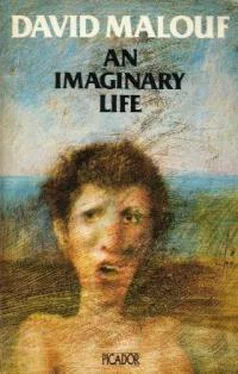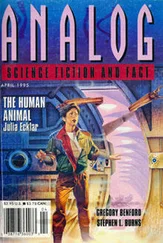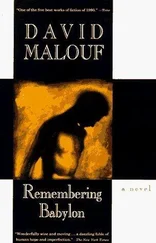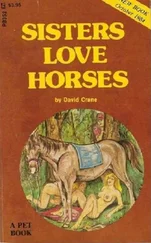David Malouf - An Imaginary Life
Здесь есть возможность читать онлайн «David Malouf - An Imaginary Life» весь текст электронной книги совершенно бесплатно (целиком полную версию без сокращений). В некоторых случаях можно слушать аудио, скачать через торрент в формате fb2 и присутствует краткое содержание. Жанр: Проза, на английском языке. Описание произведения, (предисловие) а так же отзывы посетителей доступны на портале библиотеки ЛибКат.
- Название:An Imaginary Life
- Автор:
- Жанр:
- Год:неизвестен
- ISBN:нет данных
- Рейтинг книги:5 / 5. Голосов: 1
-
Избранное:Добавить в избранное
- Отзывы:
-
Ваша оценка:
- 100
- 1
- 2
- 3
- 4
- 5
An Imaginary Life: краткое содержание, описание и аннотация
Предлагаем к чтению аннотацию, описание, краткое содержание или предисловие (зависит от того, что написал сам автор книги «An Imaginary Life»). Если вы не нашли необходимую информацию о книге — напишите в комментариях, мы постараемся отыскать её.
An Imaginary Life — читать онлайн бесплатно полную книгу (весь текст) целиком
Ниже представлен текст книги, разбитый по страницам. Система сохранения места последней прочитанной страницы, позволяет с удобством читать онлайн бесплатно книгу «An Imaginary Life», без необходимости каждый раз заново искать на чём Вы остановились. Поставьте закладку, и сможете в любой момент перейти на страницу, на которой закончили чтение.
Интервал:
Закладка:
Just before dawn I wake the Child. The women now are mostly dozing, hunched up together in their black cloaks, their heads covered, and it is easy to creep around them and out into the lane.
The Child is still half-asleep, but when we come to the edge of the marshes and the bridge to our island among the reeds, he suddenly clutches my hand, laughs, gives a little leap, and tries to drag me towards it. After nearly four months he thinks we are about to go back at last to our old life, our daily lessons in the swamp, to the birdcalls, to his fluttering attempts to entice out of the organs of his throat the vowels and consonants that have so long hidden there and which I am helping him to find. He is disappointed when I make him understand that we must go on. He looks petulant, pushing out his lower lip, and strikes my chest with his closed fist - not hard, but as an expression of his displeasure with me. He turns away and begins to moan. There is a pallid light over all the swamp with its puddles of turbid water and patches of bluish, moonstruck ice. The reeds hiss. The moon slides in and out of cloud. The child yearns toward its light on the solid, safe ground behind us, and I have to pluck at his cloak, then at last take his hand and lead him. Something perhaps in my mood warns him that this is no game, and that my refusal to enter the old life is not mere wilfullness on my part. He follows, dragging a little, and we start out across the marshes towards the river, which I know lies somewhere to the north, two or three days away as we will have to travel - on foot, and across a terrain that makes heavy going but where we will leave no sign of our passage.
My plan is to cross the river while it is still frozen and escape into the steppes. It is a desperate plan, but I can think of no other. Something deep at the bottom of my mind tells me it is what must be done and has always been intended. I think of my dreams. Of all those nights when I made my way out there in sleep to scratch in the earth for my own grave. And of that dream of the godlike horsemen. I am going out now into the unknown, the real unknown, compared with which Tomis was but a degenerate outpost of Rome, and am, I believe, following the clear path of my fate. Always to be pushing out like this, beyond what I know cannot be the limits - what else should a man’s life be? Especially an old man who has, by a clear stroke of fortune, been violently freed of the comfortable securities that make old men happy to sink into blindness, deafness, the paralysis of all desire, feeling, will. What else should our lives be but a continual series of beginnings, of painful settings out into the unknown, pushing off from the edges of consciousness into the mystery of what we have not yet become, except in dreams that blow in from out there bearing the fragrance of islands we have not yet sighted in our waking hours, as in voyaging sometimes the first blossoming branches of our next landfall come bumping against the keel, even in the dark, whole days before the real land rises to meet us. I have become braver in my old age, ready at last for all the changes we must undergo, as painfully we allow our limbs to burst into a new form, let the crust of our flesh split and the tree break through, or the moth or bird abandon us for air. What else is death but the refusal any longer to grow and suffer change? Soft and silly as I may be, I have survived. I am the last poet of our age, existing still, working still, even out here beyond the limits of our speech, even in silence. And if other old men must be willing, at the end, to push up off their deathbed and adventure out into the unknown, how much more willing must that man be whose whole life has just been such a daily exercise of adventuring, even in the stillness of his own garden? I mean, the poet?
So we stumble on, the Child and I, towards that mysterious arc of water whose name I have known all my life as marking the boundaries of our Roman world, and whose syllables Is-ter have always given me, even in the days when such notions were the merest romantic indulgence, some thrill i my innermost being that I am at last to make actual. Is-ter. Is-ter. It has been there always, somehow waiting, even as my eye noted it on maps, as the final boundary of my life, waiting to be crossed, and patient year after year for my arrival. However many steps I may have taken away from it, both in reality and in my mind, it remained, shifting its tides, freezing each season, cracking up, flowing again, whispering to me: I am the border beyond which you must go if you are to find your true life, your true death at last. Comfortably asleep in my little trundle bed at Sulmo, the spoiled second son of a rich landowner, how could I ever have guessed it? What had I to do with this last river at the end of the known world? Scribbling exotic romances in a metropolitan garden, overfed, lightheaded with wine and conversation, projecting extravagant fables on the unknown, what need had I to listen for its rising somewhere deep at the back of my head, grinding its ice floes, creaking, painfully breaking up and pushing its thousand miles to the sea? Now at last, in the early light of a late winter morning, at the very edge of spring, I make my way towards it through the dazzling swamp, hauling with me a Child I can never have expected to find again at the end point of my life, and stopping, even in the midst of the wide marsh waters, to listen for it, for the sound of its rumbling somewhere beyond the horizon there, where the seabirds are wheeling. The time has come at last. Far to the north, deep in the grasslands that roll away towards the pole, is the place I have so often dreamed of in these years of my exile, walking out under the high moonlit clouds in my sleep. The land I am about to enter is not entirely unfamiliar.
And there, after all these seasons, is the river. Is-ter. Those two magic syllables, born of my own breath frozen solid, and waiting, in these last days before it breaks up and flows again, to be crossed. As the Child and I set out upon it in the moonlight the noise is deafening, the groaning, the cracking, the grinding of its whiteness under us. Halfway across, far out in the glimmering waste of it, we can see nothing, neither the shore we have left nor the one that lies somewhere ahead. Till at last, half closing my eyes against the dazzle, I make out the fine, dark horizontal line where the earth declares itself solid again. Somewhere in the middle of our crossing, I had the cold fear that there might be no other shore, that Ister might be shoreless on that farther side, a river freezing and flowing at the border between earth and air, and all those stories of the grasslands, and their giant horsemen, the merest figments of our imagination, even when they came thundering over the ice bridge and we held our snowbound fort against them. But the earth goes on. Even beyond Ister. There is another world out there.
We have come to the shores, and prepare to enter.
No more dreams. We have passed beyond them into the last reality.
The grasslands, under the first touch of spring, sway and ripple like the sea, so that wading through them, swimming at times through the chest-high grass heads, is more like floating than walking, with no landmark as far as the eye can see. Above, an immensity of blue sky, and only the smallest, far-off clouds as ceiling.
Back there in the scrublands beyond the river this lack of objects for the eye to focus on seemed like deprivation of the spirit, and I spent my whole time longing for something to break the skyline, one of the slim dark cypresses of my home country, or a chestnut with the sun pouring through it, making every big leaf transparent, a luminous green. Here the immensity, the emptiness, feeds the spirit, and leaves it with no hunger for anything but more space, more light - as if one had suddenly glimpsed the largeness, the emptiness of one’s own soul, and come to terms with it, glorying at last in its open freedom. So one moves here as in another atmosphere. It is as if the very air were different, thinner in the head, as it can be at times on mountaintops. Even my bones seem lighter. And though I am tired almost beyond tiredness by these long days of pushing north into the sky, my body feels almost no ache, only a kind of remoteness from itself. I feel sometimes as if I were moving on two separate planes. I see us as from a great height, two tiny figures parting the grassland with a shadowy crease as we move through it, like swimmers; and from that height the body’s tiredness is as nothing. The physical ache is there but it cannot be felt over such a distance, as a cry for example, from so faroff, could not be heard. The spirit experiences what the body does but in a different form. It does not move along a line with the body, northward, dividing the grasses' light. It expands to become the whole landscape, as if space itself were its dimensions; filling the whole land from horizon to horizon and the whole arch of sky, its quality now the purest air, a myriad particles of light, each one a little center from which the whole can be grasped at a single glance, and from whose vantage point, above, I see those tiny figures crawling, who are the Child and myself. From a point far ahead I see us approaching. From a point a whole day’s distance behind us, I see us moving away. At evening big shadows move over the hills, dipping into the hollows and deepening their slopes, which are gentle enough when we come to them. On still days there is only the sound of wings, the clicketing of insects all about us, as they cluster at the grass roots or flicker in the air. When the north wind blows it freezes, and the whole landscape seethes. We crawl in then, like insects, under the roots, and let the great sea roll over us. But when the south wind blows it is warm with the first breath of spring. And already, everywhere about us, are the signs of spring: little wild flowers deep in the grass, grubs that the Child gathers, and which we feed upon, the first of the birds that come flocking back to the ripening grass heads - great clouds of them ballooning in the sky, falling like a low cloud over the uplands, suddenly streaming out before us in a funnel shape as our wading into their universe disturbs them as they feed. This is the Child’s world at last. He plunges through it joyfully, dragging me after, and on all sides finding little surprises that he leaps upon like objects he has mislaid and expected never to find again. He brings me bird eggs, holding them gently cupped in his hand, pointing out the speckles and making little cries to tell me which bird it is. And occasionally, out of a clutch of six or seven, he will give me one to suck, pushing a grass stalk through each end and showing me how to draw the goodness out. He gives me seeds to eat, and straws to munch on. He finds roots that are sweet, and tubers, digging them up with his nails and cleaning them off with a thumb to make them ready for me to chew and swallow when I can, demonstrating with his strong teeth, how they can be stripped and pounded to a pulp and the stringy fibers rejected. He finds a kind of mallow with a drop of honey in the horn, and holds his head back, pointing his tongue to take the single sticky dollop of it, and laughs when I try to do the same. His eyes are everywhere, as we walk, for whatever is edible and will sustain us.
Читать дальшеИнтервал:
Закладка:
Похожие книги на «An Imaginary Life»
Представляем Вашему вниманию похожие книги на «An Imaginary Life» списком для выбора. Мы отобрали схожую по названию и смыслу литературу в надежде предоставить читателям больше вариантов отыскать новые, интересные, ещё непрочитанные произведения.
Обсуждение, отзывы о книге «An Imaginary Life» и просто собственные мнения читателей. Оставьте ваши комментарии, напишите, что Вы думаете о произведении, его смысле или главных героях. Укажите что конкретно понравилось, а что нет, и почему Вы так считаете.












